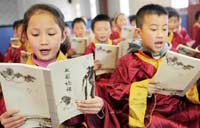Time, money draw Chinese readers to digital devices
Updated: 2014-04-25 10:00
(English.news.cn)
|
|||||||||||
"In the digital era, people don't value reading as much as before. We tend to choose shortcuts to acquire knowledge instead of
|
|
| The latest word on books: Keep those pages coming |
According to the 11th National Reading Survey, Chinese people above the age of 18 read just 4.77 books on average per year, with 50% blaming a lack of time due to work for the low number.
Zhao said the softness of the paper and the smell of the printing ink create a pleasurable experience not possible with digital reading.
"But I can't take the biography of Steve Jobs with me; it's too heavy," added Zhao.
For Cui Yuan, a migrant worker, the unbearable heaviness does not lie in the size and weight of the paper, but the soaring price.
The average price for a new book hit 52 yuan in 2012, according to the national reading market report by the Beijing Openbook Information and Technology Company.
"I would have to stay hungry to buy a book as my monthly budget is only 500 yuan," said Cui, who has begun to download "free" copies of books online and read them on his 300-yuan cellphone.
Unlike Cui, Wang Siyuan purchased his Kindle from the US and buys digital books online at almost the same price as paperbacks.
Though Wang disapproves of illegal downloading, he sympathizes with Cui's dilemma.
"When it comes to the cost of reading, fewer people will bother going to a bookstore anymore," said Wang.
Fan Xi'an, president of Sanlian Taofen Bookstore (STB), wishes more people would go back to brick-and-mortar bookstores. STB became Beijing's first 24-hr book shop in early April, thanks to a government scheme to subsidize a total of 56 bookstores around China.
To encourage more Chinese to read and buy printed books, the Chinese government in 2014 eliminated value-added tax at bookstores and announced 90 million yuan (14.6 million U.S. dollars) to support operations like STB.
"The 24-hour opening hours are needed so people from any walk of life can find some time for quiet reading after a hectic day," Fan said.
Wang Siyuan was one of the first readers to enjoy night reading at STB.
"Digital reading and traditional reading are supplementary. I can't imagine scanning my Kindle all day long without a moment of enjoyment. Nor can I wait to find an answer from a book when a click of the mouse will do the job," said Wang.
Related Stories
Prada by the book 2014-01-13 07:27
Books, not loving looks; schools ban puppy love 2013-12-24 10:14
Shanghai Metro offers passengers books to borrow 2013-08-27 10:29
Book fair attracts more digital and foreign publishers 2013-08-27 09:17
Shanghai book fair takes measures to cool down readers 2013-08-15 09:06
Today's Top News
Worries over maritime ambitions 'unnecessary'
Sudsy smiles for China's brewers
Future hangs in the balance
Foxconn wages new kind of ‘war’
Celebrities give thoughts on World Book Day
France on fine line over deficit-cut
Town 'Kill Jews' mulls name change
133 could face prostitution charges
Hot Topics
Lunar probe , China growth forecasts, Emission rules get tougher, China seen through 'colored lens', International board,
Editor's Picks

|

|

|

|

|

|








